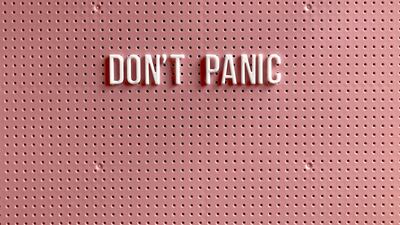"It feels like life or death," Hollywood actress Amanda Seyfried revealed on The Today Show last week, about the panic attacks she's experienced over the past few years.
"That's what a panic attack is, really. Your body just goes into fight or flight. The endorphin rush and the dump that happens after the panic attack is so extraordinary," the actress, 35, said.
"You just feel so relieved and your body is just kind of recovered in a way. It’s so bizarre because it’s physiological, but it starts in your head.”
The Mamma Mia! star, who is up for Best Supporting Actress at this week's Oscars, is far from alone in her experience, with a 2017 study by the Institute for Health Metrics and Evaluation estimating that 10.7 per cent of people globally, or 792 million, live with a mental health disorder. Of that number, 3.8 per cent, around 284 million people, have an anxiety disorder, the category panic attacks fall under.
Defined medically as combining both physical and mental effects, panic attacks are often marked by feelings of intense anxiety, increased heart rate, hyperventilation, dizziness and sweating. Patients also talk about experiencing feelings that something bad is about to happen, which they are powerless to control.
‘I didn’t know what it was’
"A panic attack is an abrupt surge of intense fear or discomfort that reaches a peak within minutes and may last from 10 to 15 minutes, or even up to an hour," says Dr Arun Kumar, a specialist psychiatrist at Aster Clinic in Dubai. "This sudden surge can occur from a calm state or an anxious state, and the first attack often occurs completely spontaneously."
"Out of the blue" is how David*, a business manager, 40, from Abu Dhabi, describes the first panic attack he experienced aged 38.
I just needed to know that no one was going to die and nothing was going to change
“I was at work, and just had this feeling that something bad was going to happen,” he says. “I don’t know where the notion came from, but it was intensely powerful and I found that suddenly I couldn’t control my heart rate or my breathing. I was trying to take in air, but it felt like there wasn’t enough oxygen in the room.
“I made it to the bathroom and just stayed in a stall for about half an hour until I’d stopped shaking. I called my wife afterwards, but couldn’t really explain the feeling because I didn’t even know myself what it was.”
But what can cause these debilitating episodes?
“The known common triggers can be, but are not limited to, injury from accidents or surgery, illness, childhood separations, interpersonal conflict or loss, drug addiction or abuse, and withdrawal from certain medications,” says Dr Sarwan Saleem, a general practitioner at Dubai London Clinic, Dubai Festival City Mall. “Or a recent temporary stressor a person cannot get their head around.”
The effects, both mental and physical
Panic attacks can be triggered by myriad external experiences, such as crowded or enclosed places or, alternatively, wide-open spaces. Work, family and relationship issues, trauma, major illness or an accident can also play a part.
Stimulants such as caffeine and nicotine can contribute, while anxiety-prone people are more likely to be affected. Women are twice more likely to experience them than men and, if panic attacks continue, they are classed as a panic disorder.
“Often, people develop specific fears and phobias, such as leaving their home, travelling, attending work or school,” says Carolyn Yaffe, a psychotherapist at Medcare Camali Mental Health Clinic. “They may also avoid social situations. Social interactions can easily trigger a panic attack when a person is experiencing social anxiety or panic disorder. They can also contribute to increased anxiety and depression and, often, people will most fear the anticipation of a panic attack rather than the panic attack itself.”
Physically, panic attacks can have a detrimental effect on the body. Gastrointestinal symptoms such as acidity, nausea and stomach pain; heart palpitations and increased blood pressure; changes in appetite; menstrual irregularities; and neurological problems such as headaches or fainting can all be side effects of panic attacks.
Many celebrities have spoken about their experiences of having panic attacks, including Oprah Winfrey, pop star Ellie Goulding and Oscar-winning actress Emma Stone.
"It was really bad," the La La Land actress told The Wall Street Journal about her first attack. "I was sitting in my friend's house, and I thought the house was burning down. I called my mom and she brought me home, and for the next three years it just would not stop. I would ask my mom to tell me exactly how the day was going to be, then ask again 30 seconds later. I just needed to know that no one was going to die and nothing was going to change."
From 'grounding' to CBT: Managing the symptoms
There are measures that can be put in place to minimise having a panic attack. Maintaining a healthy diet, exercising regularly, getting enough sleep and ensuring a work-life balance are all necessary steps. Yoga, breathwork and avoiding stimulants are additional steps, as well as being aware of the stressors that can trigger attacks and avoiding them where possible.
Jane Elizabeth, a transformational coach and energy healer at Miracles Wellness Centre in Dubai, has been practising reiki for 10 years and has seen first-hand the effect an alternative approach, coupled with medical intervention, can have on those who experience panic attacks.
“I am a big believer in morning routines, and this can really assist in preventing an attack throughout the day,” she says. “These include not reaching for your phone first thing in the morning, and not checking the news first thing either, but rather stepping outside to breathe in the morning air, saying positive affirmations and visualising a good positive day ahead.”
Relaxation and meditation are recommended by both medical and alternative medicine practitioners, with cognitive behavioural therapy (CBT) emerging as an effective tool to bolster the mind's defence against panic attacks.
"CBT teaches you different ways of thinking, behaving and reacting to the feelings that come on with a panic attack," explains Soniyaa Kiran Punjabi, the founder of Illuminations Well-Being Centre. "It is recommended as a replacement for most drug-based therapy in the highly influential Depression Report published by the London School of Economics."
But perhaps the biggest battle many face is the perceived stigma around mental health issues, which can prevent them from seeking help at the earliest possible sign. However, seeking help can result in an array of tools being made available to help manage the condition.
"An incredibly important part of treatment for panic attacks is psychoeducation," says Dr Shamaral Odusanya, a clinical psychologist at The Lighthouse Arabia. "Patients are offered insights into what is actually happening during a panic attack so that they no longer feel fearful of them when they occur."
“I advise people to utilise calming techniques,” adds Yaffe. “Deep breathing exercises and ‘grounding’, an exercise which uses your senses, tuning yourself in to what you can see, sound, smell, taste and touch.”
* Names have been changed on request
How to watch Ireland v Pakistan in UAE
When: The one-off Test starts on Friday, May 11
What time: Each day’s play is scheduled to start at 2pm UAE time.
TV: The match will be broadcast on OSN Sports Cricket HD. Subscribers to the channel can also stream the action live on OSN Play.
New UK refugee system
- A new “core protection” for refugees moving from permanent to a more basic, temporary protection
- Shortened leave to remain - refugees will receive 30 months instead of five years
- A longer path to settlement with no indefinite settled status until a refugee has spent 20 years in Britain
- To encourage refugees to integrate the government will encourage them to out of the core protection route wherever possible.
- Under core protection there will be no automatic right to family reunion
- Refugees will have a reduced right to public funds
Springsteen: Deliver Me from Nowhere
Director: Scott Cooper
Starring: Jeremy Allen White, Odessa Young, Jeremy Strong
Rating: 4/5
Small%20Things%20Like%20These
%3Cp%3EDirector%3A%20Tim%20Mielants%3Cbr%3ECast%3A%20Cillian%20Murphy%2C%20Emily%20Watson%2C%20Eileen%20Walsh%3Cbr%3ERating%3A%204%2F5%3C%2Fp%3E%0A
Sour%20Grapes
%3Cp%3E%3Cstrong%3EAuthor%3A%20%3C%2Fstrong%3EZakaria%20Tamer%3Cbr%3E%3Cstrong%3EPublisher%3A%20%3C%2Fstrong%3ESyracuse%20University%20Press%3Cbr%3E%3Cstrong%3EPages%3A%20%3C%2Fstrong%3E176%3C%2Fp%3E%0A
UAE currency: the story behind the money in your pockets
Company%C2%A0profile
%3Cp%3E%3Cstrong%3ECompany%20name%3A%20%3C%2Fstrong%3ELeap%0D%3Cbr%3E%3Cstrong%3EStarted%3A%20%3C%2Fstrong%3EMarch%202021%0D%3Cbr%3E%3Cstrong%3EFounders%3A%3C%2Fstrong%3E%20Ziad%20Toqan%20and%20Jamil%20Khammu%0D%3Cbr%3E%3Cstrong%3EBased%3A%3C%2Fstrong%3E%20Dubai%0D%3Cbr%3E%3Cstrong%3ESector%3A%20%3C%2Fstrong%3EFinTech%0D%3Cbr%3E%3Cstrong%3EInvestment%20stage%3A%20%3C%2Fstrong%3EPre-seed%0D%3Cbr%3E%3Cstrong%3EFunds%20raised%3A%3C%2Fstrong%3E%20Undisclosed%0D%3Cbr%3E%3Cstrong%3ECurrent%20number%20of%20staff%3A%20%3C%2Fstrong%3ESeven%3C%2Fp%3E%0A
Five healthy carbs and how to eat them
Brown rice: consume an amount that fits in the palm of your hand
Non-starchy vegetables, such as broccoli: consume raw or at low temperatures, and don’t reheat
Oatmeal: look out for pure whole oat grains or kernels, which are locally grown and packaged; avoid those that have travelled from afar
Fruit: a medium bowl a day and no more, and never fruit juices
Lentils and lentil pasta: soak these well and cook them at a low temperature; refrain from eating highly processed pasta variants
Courtesy Roma Megchiani, functional nutritionist at Dubai’s 77 Veggie Boutique
Wicked: For Good
Director: Jon M Chu
Starring: Ariana Grande, Cynthia Erivo, Jonathan Bailey, Jeff Goldblum, Michelle Yeoh, Ethan Slater
Rating: 4/5
Retail gloom
Online grocer Ocado revealed retail sales fell 5.7 per cen in its first quarter as customers switched back to pre-pandemic shopping patterns.
It was a tough comparison from a year earlier, when the UK was in lockdown, but on a two-year basis its retail division, a joint venture with Marks&Spencer, rose 31.7 per cent over the quarter.
The group added that a 15 per cent drop in customer basket size offset an 11.6. per cent rise in the number of customer transactions.
The%20specs
%3Cp%3E%3Cstrong%3EEngine%3A%20%3C%2Fstrong%3E4.0-litre%20twin-turbo%20V8%0D%3Cbr%3E%3Cstrong%3EPower%3A%20%3C%2Fstrong%3E640hp%20at%206%2C000rpm%0D%3Cbr%3E%3Cstrong%3ETorque%3A%20%3C%2Fstrong%3E850Nm%20from%202%2C300-4%2C500rpm%0D%3Cbr%3E%3Cstrong%3ETransmission%3A%20%3C%2Fstrong%3E8-speed%20auto%0D%3Cbr%3E%3Cstrong%3EFuel%20consumption%3A%20%3C%2Fstrong%3E11.9L%2F100km%0D%3Cbr%3E%3Cstrong%3EPrice%3A%20%3C%2Fstrong%3EDh749%2C800%0D%3Cbr%3E%3Cstrong%3EOn%20sale%3A%20%3C%2Fstrong%3Enow%3C%2Fp%3E%0A
UAE currency: the story behind the money in your pockets
Polarised public
31% in UK say BBC is biased to left-wing views
19% in UK say BBC is biased to right-wing views
19% in UK say BBC is not biased at all
Source: YouGov
Specs
Engine: Duel electric motors
Power: 659hp
Torque: 1075Nm
On sale: Available for pre-order now
Price: On request
UAE currency: the story behind the money in your pockets
Tips for avoiding trouble online
- Do not post incorrect information and beware of fake news
- Do not publish or repost racist or hate speech, yours or anyone else’s
- Do not incite violence and be careful how to phrase what you want to say
- Do not defame anyone. Have a difference of opinion with someone? Don’t attack them on social media
- Do not forget your children and monitor their online activities
More on animal trafficking
Know before you go
- Jebel Akhdar is a two-hour drive from Muscat airport or a six-hour drive from Dubai. It’s impossible to visit by car unless you have a 4x4. Phone ahead to the hotel to arrange a transfer.
- If you’re driving, make sure your insurance covers Oman.
- By air: Budget airlines Air Arabia, Flydubai and SalamAir offer direct routes to Muscat from the UAE.
- Tourists from the Emirates (UAE nationals not included) must apply for an Omani visa online before arrival at evisa.rop.gov.om. The process typically takes several days.
- Flash floods are probable due to the terrain and a lack of drainage. Always check the weather before venturing into any canyons or other remote areas and identify a plan of escape that includes high ground, shelter and parking where your car won’t be overtaken by sudden downpours.
Diriyah%20project%20at%20a%20glance
%3Cp%3E-%20Diriyah%E2%80%99s%201.9km%20King%20Salman%20Boulevard%2C%20a%20Parisian%20Champs-Elysees-inspired%20avenue%2C%20is%20scheduled%20for%20completion%20in%202028%0D%3Cbr%3E-%20The%20Royal%20Diriyah%20Opera%20House%20is%20expected%20to%20be%20completed%20in%20four%20years%0D%3Cbr%3E-%20Diriyah%E2%80%99s%20first%20of%2042%20hotels%2C%20the%20Bab%20Samhan%20hotel%2C%20will%20open%20in%20the%20first%20quarter%20of%202024%0D%3Cbr%3E-%20On%20completion%20in%202030%2C%20the%20Diriyah%20project%20is%20forecast%20to%20accommodate%20more%20than%20100%2C000%20people%0D%3Cbr%3E-%20The%20%2463.2%20billion%20Diriyah%20project%20will%20contribute%20%247.2%20billion%20to%20the%20kingdom%E2%80%99s%20GDP%0D%3Cbr%3E-%20It%20will%20create%20more%20than%20178%2C000%20jobs%20and%20aims%20to%20attract%20more%20than%2050%20million%20visits%20a%20year%0D%3Cbr%3E-%20About%202%2C000%20people%20work%20for%20the%20Diriyah%20Company%2C%20with%20more%20than%2086%20per%20cent%20being%20Saudi%20citizens%0D%3C%2Fp%3E%0A
Specs
Engine: 51.5kW electric motor
Range: 400km
Power: 134bhp
Torque: 175Nm
Price: From Dh98,800
Available: Now
BMW M5 specs
Engine: 4.4-litre twin-turbo V-8 petrol enging with additional electric motor
Power: 727hp
Torque: 1,000Nm
Transmission: 8-speed auto
Fuel consumption: 10.6L/100km
On sale: Now
Price: From Dh650,000
THE BIO
BIO:
Born in RAK on December 9, 1983
Lives in Abu Dhabi with her family
She graduated from Emirates University in 2007 with a BA in architectural engineering
Her motto in life is her grandmother’s saying “That who created you will not have you get lost”
Her ambition is to spread UAE’s culture of love and acceptance through serving coffee, the country’s traditional coffee in particular.
The National Archives, Abu Dhabi
Founded over 50 years ago, the National Archives collects valuable historical material relating to the UAE, and is the oldest and richest archive relating to the Arabian Gulf.
Much of the material can be viewed on line at the Arabian Gulf Digital Archive - https://www.agda.ae/en
Brief scores:
Manchester City 2
Gundogan 27', De Bruyne 85'
Crystal Palace 3
Schlupp 33', Townsend 35', Milivojevic 51' (pen)
Man of the Match: Andros Townsend (Crystal Palace)
Tips for taking the metro
- set out well ahead of time
- make sure you have at least Dh15 on you Nol card, as there could be big queues for top-up machines
- enter the right cabin. The train may be too busy to move between carriages once you're on
- don't carry too much luggage and tuck it under a seat to make room for fellow passengers




